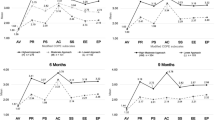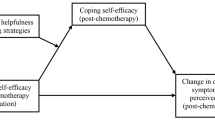Abstract
It is generally assumed that coping strategies impact quality of life (QOL). It is plausible that QOL determines use of coping strategies. This research examines coping strategies over time and the reciprocal relationship between coping strategies and QOL among younger women with breast cancer. Women with breast cancer (N = 267; mean age = 43 years) completed surveys within 6 months of diagnosis and 6 weeks and 6 months later. Surveys included questions on coping strategies, QOL, medical factors, and sociodemographics. Positive cognitive restructuring was the most frequently used strategy. Over time, use of seeking social support, spirituality, and wishful thinking declined, while detachment increased. Prior QOL predicted three subsequent coping strategies (seeking social support, keeping feelings to self, wishful thinking). Coping strategies were minimally related to subsequent QOL. Coping strategies and QOL are dynamic processes. QOL may predict coping strategies equally or more than vice versa.



Similar content being viewed by others
References
Antoni, M. H., Wimberly, S. R., Lechner, S. C., et al. (2006). Reduction of cancer-specific thought intrusions and anxiety symptoms with a stress management intervention among women undergoing treatment for breast cancer. The American Journal of Psychiatry, 163, 1791–1797. doi:10.1176/appi.ajp.163.10.1791.
Arndt, V., Merx, H., Stürmer, T., et al. (2004). Age-specific detriments to quality of life among breast cancer patients one year after diagnosis. European Journal of Cancer, 40, 673–680. doi:10.1016/j.ejca.2003.12.007.
Avis, N. E., Crawford, S., Li, D., et al. (1999). Younger women with breast cancer: A videotape intervention. Presentation as part of symposium at the annual meeting of the American Psychological Association, Boston, MA.
Avis, N. E., Crawford, S., & Manuel, J. (2004). Psychosocial problems among younger women with breast cancer. Psycho-Oncology, 13, 295–308. doi:10.1002/pon.744.
Avis, N. E., Crawford, S., & Manuel, J. (2005). Quality of life among younger women with breast cancer. Journal of Clinical Oncology, 23, 3322–3330. doi:10.1200/JCO.2005.05.130.
Avis, N. E., & Deimling, G. T. (2008). Cancer survivorship and aging. Cancer, 15, 3519–3529.
Bloom, J. R., & Kessler, L. (1994). Risk and timing of counseling and support interventions for younger women with breast cancer. Journal of the National Cancer Institute. Monographs, 16, 199–206.
Brady, M. J., Cella, D. F., Mo, F., et al. (1997). Reliability and validity of the functional assessment of cancer therapy-breast quality-of-life instrument. Journal of Clinical Oncology, 15, 974–986.
Buddeberg, C., Wolf, C., Sieber, M., et al. (1991). Coping strategies and course of disease of breast cancer patients: Results of a 3-year longitudinal study. Psychotherapy & Psychosomatics, 55, 151–157.
Carver, C. S., Pozo, C., Harris, S. D., et al. (1993). How coping mediates the effect of optimism on distress: A study of women with early stage breast cancer. Journal of Personality and Social Psychology, 65, 375–390. doi:10.1037/0022-3514.65.2.375.
Cella, D. F., Tulsky, D. S., Gray, G., et al. (1993). The functional assessment of cancer therapy scale: Development and validation of the general measure. Journal of Clinical Oncology, 11, 570–579.
Cimprich, B., Ronis, D. L., & Martinez-Ramos, G. (2002). Age at diagnosis and quality of life in breast cancer survivors. Cancer Practice, 10, 85–93. doi:10.1046/j.1523-5394.2002.102006.x.
Compas, B. E., Stoll, M. F., Thomsen, A. H., et al. (1999). Adjustment to breast cancer: Age-related differences in coping and emotional distress. Breast Cancer Research and Treatment, 54, 195–203.
Cordova, M. J., Giese-Davis, J., Golant, M., et al. (2003). Mood disturbance in community cancer support groups: The role of emotional suppression and fighting spirit. Journal of Psychosomatic Research, 55, 461–467. doi:10.1016/S0022-3999%2803%2900510-5.
Culver, J. L., Arena, P. L., Antoni, M. H., et al. (2002). Coping and distress among women under treatment for early stage breast cancer: Comparing African Americans, Hispanics, and non-hispanic Whites. Psycho-Oncology, 11, 495–504. doi:10.1002/pon.615.
David, D., Montgomery, G. H., & Bovbjerg, D. H. (2006). Relations between coping responses and optimism-pessimism in predicting anticipatory psychological distress in surgical breast cancer patients. Personality and Individual Differences, 40, 203–213. doi:10.1016/j.paid.2005.05.018.
Diggle, P. J., Liang, K.-Y., & Zeger, S. L. (1994). Analysis of longitudinal data. Oxford: Clarendon Press.
Dunkel-Schetter, C., Feinstein, L. G., Taylor, S. E., et al. (1992). Patterns of coping with cancer. Health Psychology, 11, 79–87. doi:10.1037/0278-6133.11.2.79.
Dunn, J., & Steginga, S. K. (2000). Young women’s experience of breast cancer: Defining young and identifying concerns. Psycho-Oncology, 9, 137–146. doi:10.1002/%28SICI%291099-1611%28200003%2F04%299%3A2<137%3A%3AAID-PON442>3.0.CO%3B2-0.
Ganz, P. A., Greendale, G. A., Petersen, L., et al. (2003). Breast cancer in younger women: Reproductive and late health effects of treatment. Journal of Clinical Oncology, 21, 4184–4193. doi:10.1200/JCO.2003.04.196.
Heim, E., Valach, L., & Schaffner, L. (1997). Coping and psychosocial adaptation: Longitudinal effects over time and stages in breast cancer. Psychosomatic Medicine, 59, 408–418.
Helgeson, V. S., Cohen, S., Schulz, R., et al. (2000). Group support interventions for women with breast cancer: Who benefits from what? Health Psychology, 19, 107–114. doi:10.1037/0278-6133.19.2.107.
King, M. T., Kenny, P., Shiell, A., et al. (2000). Quality of life three months and one year after first treatment for early stage breast cancer: Influence of treatment and patient characteristics. Quality of Life Research, 9, 789–800.
Kroenke, C. H., Rosner, B., Chen, W. Y., et al. (2004). Functional impact of breast cancer by age at diagnosis. Journal of Clinical Oncology, 22, 1849–1856. doi:10.1200/JCO.2004.04.173.
Lazarus, R. S., & Folkman, S. (1984). Stress, appraisal, and coping. New York: Springer.
Lehto, U. S., Ojanen, M., & Kellokumpu-Lehtinen, P. (2005). Predictors of quality of life in newly diagnosed melanoma and breast cancer patients. Annals of Oncology, 16, 805–816. doi:10.1093/annonc%2Fmdi146.
Lipsitz, S. R., Leong, T., Ibrahim, J., et al. (2001). A partial correlation coefficient and coefficient of determination for multivariate normal repeated measures data. The Statistician, 50, 87–95. doi:10.1111/1467-9884.00263.
Manuel, J. C., Burwell, S. R., Crawford, S. L., et al. (2007). Younger women’s perceptions of coping with breast cancer. Cancer Nursing, 30, 85–94. doi:10.1097/01.NCC.0000265001.72064.dd.
McCaul, K. D., Sandgren, A. K., King, B., et al. (1999). Coping and adjustment to breast cancer. Psycho-Oncology, 8, 230–236. doi:10.1002/%28SICI%291099-1611%28199905%2F06%298%3A3<230%3A%3AAID-PON374>3.0.CO%3B2-%23.
Mor, V., Malin, M., & Allen, S. (1994). Age differences in the psychosocial problems encountered by breast cancer patients. Journal of the National Cancer Institute. Monographs, 16, 191–197.
Mosher, C. E., & Danoff-Burg, S. (2005). A review of age differences in psychological adjustment to breast cancer. Journal of Psychosocial Oncology, 23, 101–114. doi:10.1300/J077v23n02_07.
Munro, B. H. (2001). Statistical methods for health care research (4th ed.). Philadelphia: Lippincott Williams & Wilkins.
Naughton, M. J., & Shumaker, S. A. (1998). Assessment of health-related quality of life. In L. M. Friedman, C. D. Furburg, & D. L. DeMets (Eds.), Fundamentals of clinical trials (3rd ed., pp. 185–203). New York: Springer-Verlag.
Scheier, M. F., & Carver, C. S. (1985). Optimism, coping, and health: Assessment and implications of generalized outcome expectancies. Health Psychology, 4, 219–247. doi:10.1037/0278-6133.4.3.219.
Scheier, M. F., Helgeson, V. S., Schulz, R., et al. (2007). Moderators of interventions designed to enhance physical and psychological functioning among younger women with early-stage breast cancer. Journal of Clinical Oncology, 25, 5710–5714. doi:10.1200/JCO.2007.11.7093.
Sears, S. R., Stanton, A. L., & Danoff-Burg, S. (2003). The yellow brick road and the emerald city: Benefit finding, positive reappraisal coping and posttraumatic growth in women with early-stage breast cancer. Health Psychology, 22, 487–497. doi:10.1037/0278-6133.22.5.487.
Sehlen, S., Song, R., Fahmüller, H., et al. (2003). Coping of cancer patients during and after radiotherapy—a follow-up of 2 years. Onkologie, 26, 557–563. doi:10.1159/000074151.
Stanton, A. L., Danoff-Burg, S., Cameron, C. L., et al. (2000). Emotionally expressive coping predicts psychological and physical adjustment to breast cancer. Journal of Consulting and Clinical Psychology, 68, 875–882. doi:10.1037/0022-006X.68.5.875.
Stanton, A. L., Estes, M. A., Estes, N. C., et al. (1998). Treatment decision making and adjustment to breast cancer: A longitudinal study. Journal of Consulting and Clinical Psychology, 66, 313–322. doi:10.1037/0022-006X.66.2.313.
Walsh, S. R., Manuel, J. C., & Avis, N. E. (2005). The impact of breast cancer on younger women’s relationships with their partner and children. Family, Systems, & Health, 23, 80–93. doi:10.1037/1091-7527.23.1.80.
Wenzel, L. B., Fairclough, D. L., Brady, M. J., et al. (1999). Age-related differences in the quality of life of breast carcinoma patients after treatment. Cancer, 86, 1768–1774. doi:10.1002/%28SICI%291097-0142%2819991101%2986%3A9<1768%3A%3AAID-CNCR19>3.0.CO%3B2-O.
Author information
Authors and Affiliations
Corresponding author
Rights and permissions
About this article
Cite this article
Danhauer, S.C., Crawford, S.L., Farmer, D.F. et al. A longitudinal investigation of coping strategies and quality of life among younger women with breast cancer. J Behav Med 32, 371–379 (2009). https://doi.org/10.1007/s10865-009-9211-x
Received:
Accepted:
Published:
Issue Date:
DOI: https://doi.org/10.1007/s10865-009-9211-x




